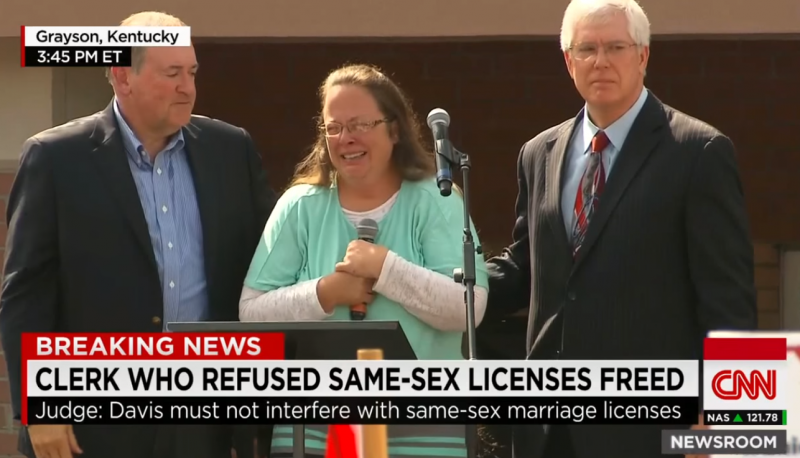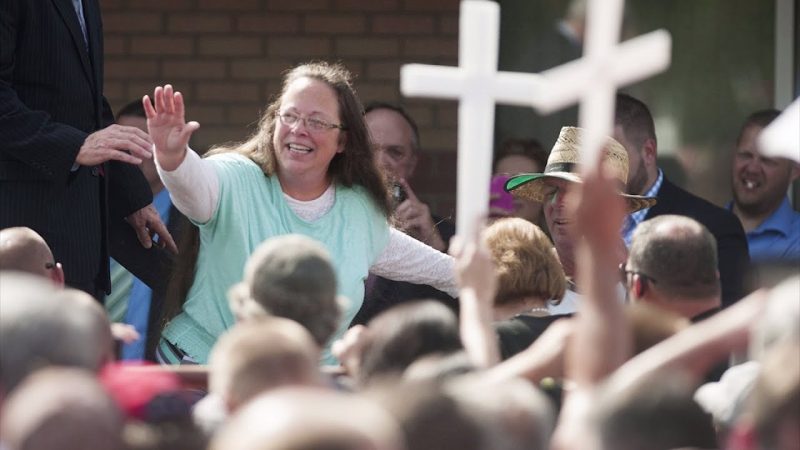In September 2015, Kim Davis, the clerk of Rowan County, Kentucky, spent five days in jail for defying a court order to issue marriage licenses after the Supreme Court had ruled state gay-marriage bans unconstitutional. Her case became a rallying cry for Religious Right activists who had warned that advances in equality for LGBTQ people would spell the end of freedom for conservative Christians, and put her attorneys at the far-right anti-LGBTQ organization Liberty Counsel on the national map.
In February, Liberty Counsel published a book on the saga written by Davis “with” Liberty Counsel’s founder, Mat Staver, and its director of creative services, John Aman. The book, “Under God’s Authority: The Kim Davis Story,” is available for a $25 donation to Liberty Counsel.
In it, Davis recounts what she frames as her divine calling to stand up to the advances of marriage equality, even as she is abandoned by lesser Christians and accosted by gay people who have the nerve to demand marriage licenses. The heroes in Davis’ narrative are her Liberty Counsel attorneys, whose legal skills she describes in glowing terms, and Matt Bevin, who was elected governor of Kentucky soon after Davis’ time in jail. Bevin helped Liberty Counsel promote the book, calling Davis “an inspiration” to “the children of America.”
Davis describes the news of the Supreme Court’s decision in the Obergefell case as “hearbreaking beyond belief.” When then-Gov. Steve Beshear, a Democrat, ordered county clerks in the state to issue marriage licenses to same-sex couples in compliance with the court ruling, Davis writes, she thought, “Well, maybe he could abandon his convictions—if he had them—in a matter of minutes. I could not.”
“Whatever the cost, I said, there was no way I would issue same-sex licenses,” she recalls. “To do so was, for me, a heaven or hell decision. It was black and white, with no gray at all.”
After Beshear, the next people to turn their backs on Davis, in her telling, were her fellow county clerks, all but two of whom “reversed course” and agreed to issue marriage licenses under mounting pressure.
As protesters (who “didn’t think my rights mattered”) start to gather at her office, Davis meets with her next betrayal, this time from a lesbian couple whom she had known for years and considered to be “friends.” They ask her for a marriage license. “I’ve known you my whole life,” Davis recalls telling one of them. “Why do you want to come here and do this? You know I’m not issuing licenses.”
Other gay and lesbian couples show up asking for marriage licenses, including a couple whom Davis refers to as “the two Davids.” (“But for sheer drama, nothing outdid the two Davids.”) The Davids, she writes, “could have driven a half hour to a neighboring county and obtained” their license. Instead, they “wanted to make me bow down—to accept and acknowledge them as a legitimate married couple. And that I wasn’t going to do.”
The betrayals continued. “It wasn’t just the governor who turned his back on county clerks like me…Nearly every politician in Kentucky, with a few notable exceptions, were guardedly silent and did nothing on our behalf.” Davis recalls a conversation with a Democratic county judge executive, Doc Blevins, who “believed, like me, that marriage is between a man and a woman” but “wouldn’t take my side in public.”
“Kim, he said, “I’m not as strong as you. I just can’t do it.”
“Well, I’ll tell you what I’m going to do,” I replied. “I’m going to pray for you. I’m going to pray that this rolls over in your mind again and again and again. And I’m going to pray that your bed is like a bed of nails and your pillow is like a rock so that you cannot sleep. That this consumes you, that it keeps you awake because you will not do for your Lord.”
With his hands folded, Doc sat up and leaned forward as I talked.
“You won’t take a stand,” I said, “and you claim that you’re a Christian, but your actions aren’t saying that.”
“Wow, he said, “you are one spiritual lady.”
Davis laughs and said that it’s just that she’s “somebody that loves the Lord with my whole heart, my body, and my soul.” Blevins does not come around. “Things would have been so much different inside the courthouse if Doc Blevins had stood with me,” she writes. “Other county officials might have come alongside. And I would not have become the black sheep of the courthouse.”
Davis later writes of Blevins’ testimony in her trial, where he said that he would be willing to issue marriage licenses despite his personal religious beliefs: “Judge Blevins prostrated himself before Caesar and that didn’t sit well with the crowd outside. After the hearing, the people who came out to support me and natural marriage shamed Judge Blevins, turning their backs to him as he walked through the crowd to his car.”
The betrayals keep coming. At a meeting of the Kentucky County Clerks Association’s marriage committee, all but one of her fellow clerks say that they will issue marriage licenses to same-sex couples, although some “toyed with giving out marriage licenses to same-sex couples in order to share the gospel,” which Davis says “would never work.” (Davis writes earlier in the book that she was inspired to run for the county clerk position, which had been previously held by her mother, after an evangelist visited her church and urged parishioners to “take back their communities for Christ” by running for office.)
Every one of the clerks on the committee, she writes, “was a professing Christian,” which “puzzled me.”
“I respect each and every one of my fellow clerks, and I don’t make light of their judgment or their commitment to the Lord,” she writes. “But somehow they were willing to backpedal. Again, it’s not my place to point fingers but I wondered how, if they were fasting and seeking God, they could give in and authorize same-sex ‘marriages’—acting against their conscience and against their God.”
Davis is sued by the ACLU, and finds her case before federal judge David Bunning, who was “said to be a Roman Catholic who loved God” although she discovers that “that didn’t seem to make much difference.”
Eventually, “Judge Bunning ordered me to authorize what God Himself condemns in the strongest possible terms in both the Old and New Testaments. Even though the Bible could not be more clear in its definition of marriage and its disapproval of sex between two men or two women, the judge made light of the burden he was imposing on me.”
As the case goes on, Davis writes, “political allies were growing ever harder to find.” She asks her state representative, Rocky Adkins, to get the governor to call a special session of the legislature to pass a bill taking clerks’ names off marriage licenses, and he never gets back to her. “Rocky uses the campaign slogan, ‘Fighting for Us,’ but he sure didn’t fight for me.”
Eventually, Judge Bunning orders Davis to be jailed until her office starts issuing marriage licenses again. Davis writes that she felt at peace during her time in jail, and used the opportunity to read and re-read Martin Luther King Jr.’s “Letter from Birmingham Jail.” “I would have been right there with Dr. King because I am appalled by and opposed to racism in any form,” she assures readers.
While Davis’ story has many villains, there are a few knights in shining armor. First, Liberty Counsel seeks out Davis and represents her in her case. While politicians “abandoned me,” she writes, “Liberty Counsel stuck with me all the way and its wonderful attorneys and staff have become dear friends.” Davis describes Liberty Counsel’s work in glowing terms, from its “brilliant argument” in a Supreme Court appeal that still did not “open the Justice’s blind eyes” to the “beautiful briefs” they wrote on her behalf.
“God gave me another champion, too,” Davis writes: Matt Bevin, “a godly man who lets the Lord lead and guide him.” Bevin used Davis’ case as a campaign issue, and she recorded a robo-call for him. Bevin won his election, which Davis chalked up to “supernatural intervention,” and quickly issued an executive order removing county clerks’ names from marriage licenses.
Davis writes that her experience, and the support she got from Bevin, helped spur her to end her lifelong affiliation with the Democratic Party, which had become “hostile to religious freedom” and is “no friend to evangelical Christians,” although she also writes that she couldn’t bring herself to vote for Barack Obama in 2008. Davis writes that she couldn’t understand how Obama, “who claimed to be a Christian,” could change his mind on marriage equality: “Even before I recommitted my life to God, I knew Obama wasn’t what he said he was.”
Davis found herself in close proximity to Obama when Rep. Jim Jordan of Ohio invited her to his final State of the Union address. She was not impressed:
When the House sergeant-at-arms cried out, ‘Mr. Speaker, the President of the United States,’ Obama entered and cheers filled the chamber. To be honest, I did more praying for the President than clapping as he worked his way to the rostrum. I wasn’t in awe of him at all because he didn’t represent what I valued.
If I could have gotten close enough, I would have put my hand on the President in prayer. That wasn’t possible, so as the crowd cheered, I simply asked God to bring the President’s will into alignment with His divine will, and bring his ungodliness to an end so righteousness can triumph.
In addition to her trip to the State of the Union, Davis writes of her meeting with Pope Francis, rejecting the Vatican’s attempts to downplay the extent of the pope’s support for her.
David also writes with gratitude of other friends she made out of her ordeal, including conservative activist Elizabeth Johnston, who Staver says in an epilogue to the book was inspired by Davis to start her online activism under the name “Activist Mommy.”
Davis also speaks with appreciation of former Arkansas Gov. Mike Huckabee, who along with Staver accompanied Davis when she was released from jail, and who wrote the foreword to the book. Davis’ case, Huckabee wrote in his foreword, shows that “[w]e now face the criminalization of Christianity in this country.”
Bevin and Johnston provided blurbs for the book, along with evangelists Franklin Graham and James Robison, GOP operative and pseudo-historian David Barton, anti-equality activists Michael Brown and Deacon Keith Fournier, and National Hispanic Christian Leadership Conference president Samuel Rodriguez.
Davis warns repeatedly that her case is a preview of persecution yet to come for American Christians, thanks to marriage equality: “The Court’s opinion defied thousands of years of human custom and forced me into a hard and costly choice. Would I obey God? Or would I bow down before a silly, unfounded and radical redefinition of marriage delivered by five lawyers in black robes? That’s a choice more and more Americans now face in the wake of the court’s same-sex ‘marriage’ opinion. And one you may have to make someday soon, too.”








